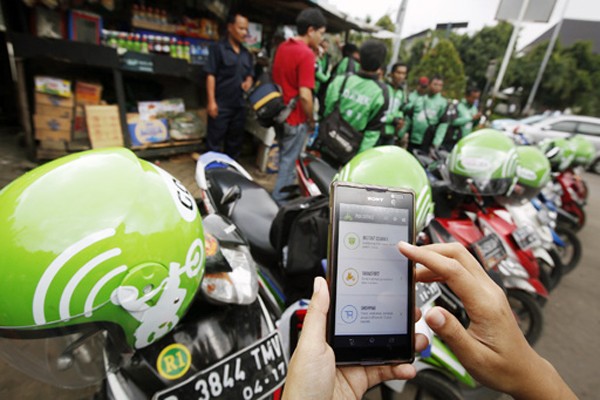Popular Reads
Top Results
Can't find what you're looking for?
View all search resultsPopular Reads
Top Results
Can't find what you're looking for?
View all search resultsRide-hailing apps saga begins another confusing episode
Change text size
Gift Premium Articles
to Anyone
R
ide-hailing app companies, such as GrabCar, Uber and Go-Car, and their partners are again entangled in a legal mess as a result of confusion stemming from a recently enforced government regulation.
Transportation Ministry regulation no. 32/2016 — issued in April, but only coming into effect at the beginning of October — stipulates that only cars with engine specifications of 1,300 cc or higher can be used by the drivers of app companies.
However, the Jakarta Transportation Agency confirmed that it had passed more than 700 cars with engine specifications lower than 1,300 cc under its vehicle roadworthiness test (KIR). The test itself is another requirement of the regulation that the drivers must meet, so they can operate legally.
The agency claimed that the some of the 700 cars had been referred to them by the Transportation Ministry. “If [the Transportation Ministry] referred a bicycle for the KIR, we would test it too,” Jakarta Transportation Agency head Andri Yansyah said.
On the other hand, the ministry argued that it was only referring to Ministerial Decree No. 35/2003 on public transportation because the regulation had not been implemented. The decree does not put any restriction on engine specification for the KIR test.
“We thought [when the regulation was being drafted] that the vehicles used by the online based transportation apps were the likes of [Toyota] Avanzas or [Daihatsu] Xenias,” said Transportation Ministry’s transportation and multimode director Cucu Mulyana. Those two models have engine specifications 1,300 cc and above.
Cucu said that the 700 cars that passed the KIR test could operate as usual, but the ministry provided no further legal assurance other than Cucu’s statement.
As reported before, the app companies’ legal woes began several months ago when conventional taxi drivers took to the streets in protest at the former’s services, which they blamed for their dwindling income.
The government then issued the regulation, which, in addition to the KIR test, also required the drivers to possess type-A driver’s licenses for public transportation and to have their vehicle ownership transferred to cooperatives that partnered with the app companies.
However, the implementation has gone back and forth and the app companies’ drivers have themselves staged protests, claiming their own operations had been hampered by the regulation.
Meanwhile, Indonesian Car Rental Businessmen Association (PPRI) chairman Ponco Seno, whose cooperative partners with GrabCar, said it would ask the government to postpone the implementation of the regulation until March 2017, to allow hundreds of its drivers to take the test.
The PPRI has 550 drivers whose car engines are below 1,300 cc. As many as 200 drivers have not undergone the test. “I feel bad for the drivers who already purchased the cars [below 1,300 cc],” he said.
Separately, Indonesian Transportation Society (MTI) expert committee chairman Danang Parikesit said the regulation did not have a strong fundamental basis and did not actually address consumers’ interests.
“The regulation does not put much emphasis on the quality of the IT-based transportation for the people. It seems to lean more on the corporate side than on the users’ side.”










